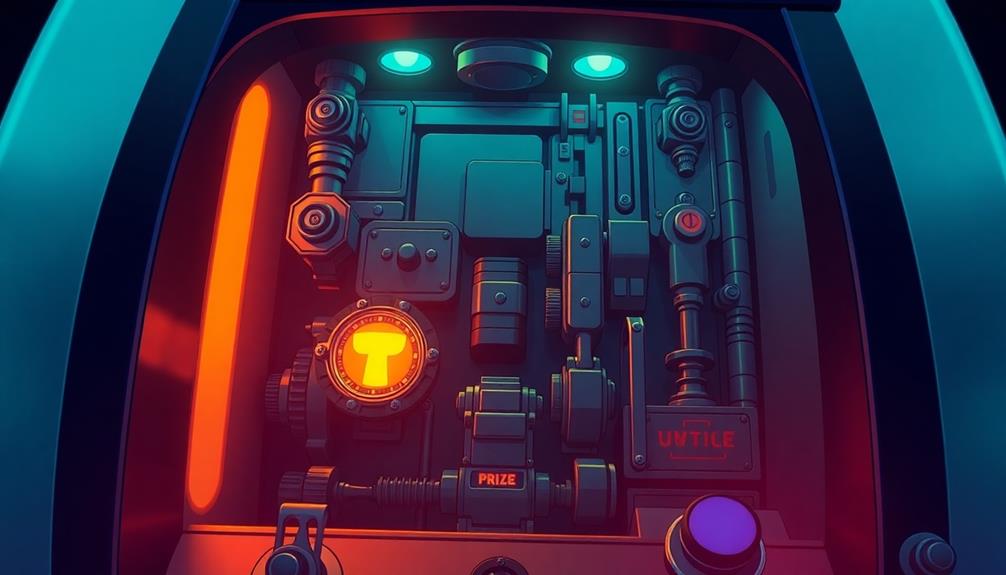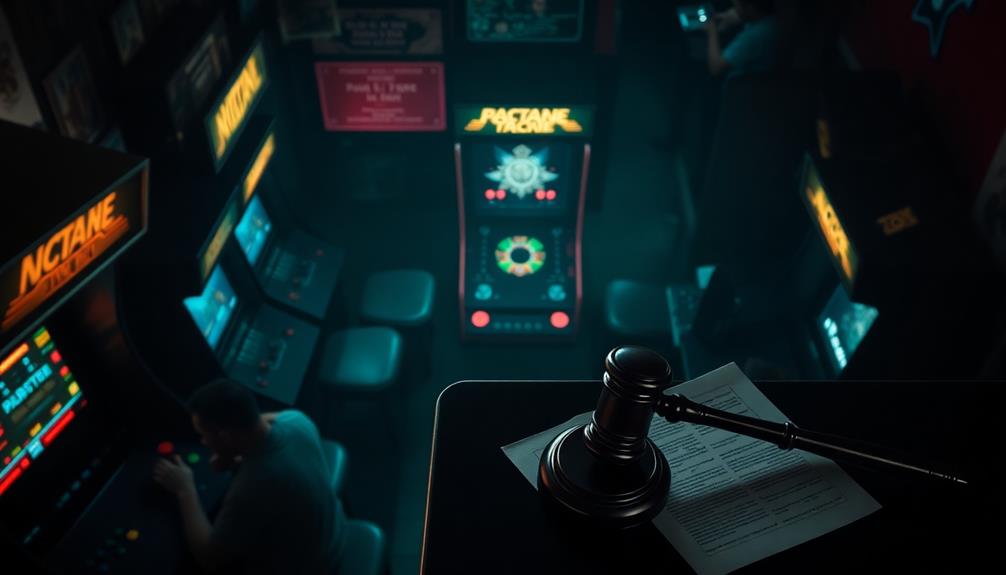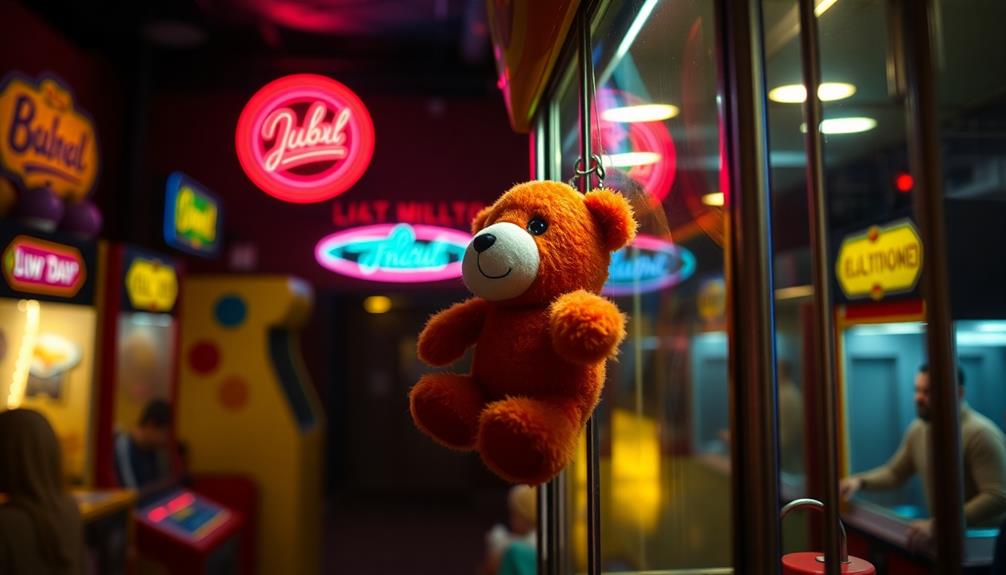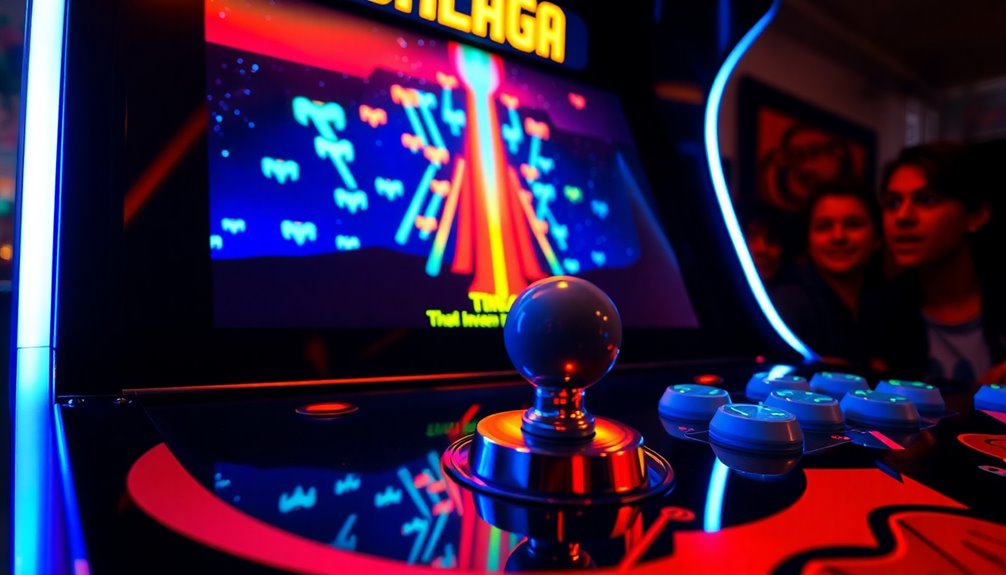Yes, numerous arcade games, including Key Master, are designed to favor the house. Despite being advertised as games of skill, the reality is quite the opposite. Players may notice that these games typically require around 700 losses before providing a chance to win, making victories few and far between. While the gameplay supposedly relies on precise timing, many players see it as more luck-based. Considering the lawsuits alleging deceptive practices, it’s evident that faith in these games is diminishing. There is much more to delve into regarding this issue, so keep exploring for further insights. One potential method for gaining deeper insights into this matter is by analyzing pacman battle royale. By evaluating the mechanics and odds of winning in popular arcade games like Key Master through a critical perspective, one may uncover more about the true nature of these games. By examining the algorithms and design choices, a clearer understanding of how these games are intentionally made challenging to win may come to light. As conversations surrounding fair gaming practices persist, the significance of game analysis in exposing potential misleading tactics becomes increasingly crucial.
Key Takeaways
- Key Master games often feature a default setting of around 700 losses before a win, suggesting rigged mechanics against players.
- Legal actions, including a $1 million settlement, indicate deceptive practices in skill-based marketing of arcade games.
- The Arizona Attorney General classified Key Master as a gambling device, raising concerns over its fairness and transparency.
- Players frequently report low winning rates and manipulation, leading to skepticism about the skill-based claims of these games.
- Ongoing lawsuits and regulatory scrutiny may prompt changes to ensure transparency and restore trust in arcade gaming.
Overview of Key Arcade Games
When you think of key arcade games, you might picture a fun challenge that tests your skills, but the reality can be quite different.
Take Key Master machines, for instance. Marketed as a game of skill, they often operate under deceptive conduct, rigged against players hoping to win prizes. Instead of rewarding skill, these machines frequently stack the odds in favor of the house. Many players may not realize that the mechanics of these games can be similar to the factors influencing gameplay performance in pinball, where optimal angles for pinball machines can considerably affect outcomes.
Reports point out that players may face a staggering default setting of 700 losses before they're even allowed a win. The mechanics require you to maneuver a key into a specific keyhole, but the timing is often adjusted to guarantee that success is nearly impossible, regardless of your abilities. Many players are misled into believing that their skills will lead them to victories, yet evidence shows low winning rates and high loss thresholds.
Historically, scrutiny over these practices has led to lawsuits, including a notable $1 million settlement in Arizona for similar rigging allegations.
Details of the Class Action

A significant class action lawsuit has been filed in California by Marcelo Muto, targeting Sega and associated companies for allegedly rigging the Key Master arcade game. The lawsuit seeks $5 million in damages, claiming that what's marketed as a skill-based game is actually designed to operate on chance.
Players might be surprised to learn they're expected to lose a predetermined number of times—reportedly 700—before they can win. Understanding the implications of financial mistakes to avoid in gaming can help players make more informed decisions about their spending.
Here's what you need to know:
- Deceptive Practices: The lawsuit alleges Sega misleads consumers into believing skill determines outcomes.
- Pre-programmed Losses: The claim suggests players face a set limit of losses before winning, which raises ethical concerns.
- Legal Precedents: Previous lawsuits, including a $1 million settlement in Arizona, have highlighted similar issues with the game's mechanics.
- Demand for Transparency: The ongoing class action aims to compel Sega to reveal the true mechanics behind the Key Master arcade game.
This case sheds light on the need for accountability in the arcade industry, ensuring consumers aren't misled by deceptive marketing practices.
Mechanics Behind Key Master

Many players mightn't realize the intricate mechanics behind the Key Master arcade game, which considerably undermine its supposed skill-based nature. The game is often rigged, requiring you to make a predetermined number of attempts—typically around 700 losses—before you can actually win a prize.
This setup means that even if you think you're honing your skill, the game is rigged against you. Understanding the vulnerabilities in device security can help players become more aware of similar deceptive practices in arcade games, which may manipulate user experiences for profit email and communication security.
Operators have the ability to individually program each machine, adjusting how many attempts are needed for a win. When you maneuver the joystick to align the key with the keyhole, you might feel in control, but the mechanics often guarantee that the key overshoots the keyhole unless the machine is set to pay out.
Despite its marketing as a skill-based game, evidence shows that winning relies more on pre-programmed timing than on your abilities. Many players have shared their experiences online, confirming that Key Master operates more as a game of chance rather than a true test of skill.
Understanding these mechanics can help you see the game for what it truly is—a cleverly designed trap for your quarters.
Historical Legal Issues

You might be surprised to learn that Key Master arcade games have faced numerous lawsuits since 2013, raising serious questions about their fairness.
The legal battles, including a significant class action settlement, highlight the ongoing struggle between players and game manufacturers.
Issues surrounding transparency and fairness in gaming are similar to those in Gold IRA options, as they both emphasize the importance of trust and clarity in financial transactions.
As regulatory bodies step in, it's essential to understand how these issues shape the future of arcade gaming.
Previous Lawsuits Overview
Deception has long loomed over arcade games, particularly with machines like the Key Master. Since 2013, several lawsuits have emerged, raising serious concerns about the machine's claims of being skill-based.
In a volatile economy, just as investors seek diversification by exploring options like a Gold IRA to protect their assets, players are increasingly wary of how arcade games are marketed.
Here's a quick rundown of the key legal issues surrounding these machines:
- Arizona Attorney General's Findings: In 2019, the Arizona Attorney General revealed that players often needed an average of 2,200 attempts to win, categorizing the Key Master as a gambling device.
- Rejected Class Action Lawsuit: A 2015 class action settlement was thrown out due to administrative issues regarding the allegations of deceptive conduct tied to the game's programming.
- Significant Settlement: Betson Coin-Op faced a major lawsuit in 2019, ultimately settling for $1 million and agreeing to cease leasing Key Master machines in Arizona due to rigging claims.
- Ongoing Scrutiny: The legal battles reflect a growing concern about transparency and fairness in arcade gaming, especially for machines marketed as skill-based.
These lawsuits paint a troubling picture of the Key Master, raising questions about whether players are truly engaging in a fair game or just rolling the dice on rigged outcomes.
Regulatory Responses and Impacts
Concerns surrounding the fairness of arcade games like Key Master have prompted significant regulatory responses. The classification of the Key Master game as a gambling device by the Arizona Attorney General Mark in 2019 highlighted the serious issues surrounding its rigged payout mechanics. This led to substantial legal actions, including a $1 million settlement that forced Betson Coin-Op to cease operations of Key Master machines in Arizona.
| Year | Event | Outcome |
|---|---|---|
| 2013 | Initial lawsuits filed | Ongoing scrutiny |
| 2015 | Class action lawsuit | Rejected due to administrative issues |
| 2019 | Arizona AG's classification | Key Master deemed a gambling device |
Regulatory scrutiny has intensified, particularly regarding the game's marketing as a skill-based game. Investigations reveal concerns about deceptive conduct, raising questions about fairness and transparency in arcade gaming practices. The continued debate over whether these games are genuinely skill-based or simply disguised gambling devices remains a hot topic. As a player, you should be aware of these regulatory impacts, as they shape the landscape of arcade gaming and influence your experience at these machines.
Rebranding and Regulatory Responses

As you explore the rebranding of Key Master to Prize Locker, you might notice how Sega markets it as a skill-based game despite ongoing allegations.
This shift raises questions about the regulation of arcade games and the transparency of their mechanics, particularly as public interest in fair play and consumer rights increases.
The evolving landscape of gaming regulations highlights the importance of understanding these dynamics, as seen in the growing focus on building codes and zoning laws for other entertainment structures.
You'll want to reflect on how these changes impact player trust and the legal landscape surrounding arcade gaming.
Key Master Rebranding Efforts
Rebranding the Key Master arcade game as Prize Locker reflects Sega's attempt to address ongoing scrutiny and legal challenges surrounding its operations. This move comes as the company attempts to distance itself from allegations of deceptive practices and a series of lawsuits questioning whether the game functions as a gambling device.
Despite being marketed as a 100% skill-based game, skepticism remains. The rise of AI-driven platforms in various industries has heightened consumer awareness regarding fairness and transparency, making Sega's efforts even more critical. Furthermore, innovations in AI technology could potentially enhance the monitoring of game fairness to guarantee compliance with regulations.
Here are four key aspects of this rebranding effort:
- Conversion Kits: Sega offers kits for operators to modify Key Master machines, aligning them with skill-based gaming regulations.
- Legal Pressures: Ongoing lawsuits have forced Sega to reconsider the marketing and mechanics of the game to avoid further legal complications.
- Consumer Trust: The shift to Prize Locker aims to rebuild consumer confidence in the game's fairness and transparency.
- Market Presence: Even with the rebranding, Key Master machines still circulate in various venues, raising questions about the effectiveness of these changes.
Ultimately, while Sega's rebranding efforts signal a recognition of past issues, the effectiveness of the Prize Locker name in improving public perception remains uncertain.
Regulation of Arcade Games
How do regulations shape the landscape of arcade games like the recently rebranded Prize Locker? In light of the controversies surrounding the Key Master game, regulations play a significant role in guaranteeing fair play. Allegations of the game being rigged against players have sparked considerable consumer concern, leading to lawsuits against Sega.
The Arizona Attorney General even classified Key Master as gambling due to its deceptive conduct, highlighting the need for stricter regulation in the arcade gaming industry. Additionally, similar to how Gold IRAs offer potential for long-term capital appreciation, guaranteeing fair play in arcade games can enhance player trust and participation, ultimately benefiting the industry as a whole.
As these legal actions unfold, the push for consumer protection becomes increasingly essential. Operators can access conversion kits to modify Key Master machines, which suggests a recognition of regulatory non-compliance and a need for transparency in gaming practices.
However, the ongoing circulation of these machines raises questions about the effectiveness of current regulatory responses. You might wonder whether the rebranding to Prize Locker is merely a façade, masking the same issues that plagued Key Master.
Without robust regulations, arcade games may continue to operate in a gray area, leaving players vulnerable to potentially rigged experiences. Stricter oversight is necessary to safeguard players and maintain the integrity of arcade games.
Transparency in Game Mechanics
Guaranteeing transparency in game mechanics is vital for restoring player trust in arcade games like the recently rebranded Prize Locker.
Despite claims of being a 100% skill-based game, the ongoing allegations of deceptive practices surrounding the Key Master game raise significant questions.
Transparency helps clarify the distinction between skill and chance, which is essential for fair play.
Understanding emotional regulation in games can also reflect players' reactions to perceived fairness, similar to how individuals with BPD experience intense emotional responses.
Here are four key areas where transparency can improve player experience:
- Clear Game Instructions: Players should understand how to play and win, eliminating confusion about skill versus luck.
- Game Mechanics Disclosure: Operators must disclose how the game actually works, including odds and payout structures.
- Regulatory Compliance: Arcade operators should adhere to regulations that guarantee fair play and protect consumers.
- Regular Audits: Implementing periodic checks can assure that games remain true to their advertised nature.
Consumer Reactions and Experiences

In recent years, many players have voiced their frustrations with arcade games like Key Master, feeling that the odds are stacked against them. Anecdotal evidence suggests that these machines are rigged, leading to a low winning rate that often leaves players disillusioned after discovering the reality behind the game.
Initially, many believe they're engaging in a game of pure skill, but they soon realize that players can only win after a certain number of losses. This manipulation resembles the tactics employed by individuals with narcissistic traits, who often disguise their true intentions to maintain control and evade accountability, as seen in narcissistic deceptive behaviors.
This deceptive conduct is particularly harmful for children and inexperienced gamers, who may spend significant amounts of money chasing a win that feels just out of reach. Many players have reported needing hundreds of attempts before finally securing a win, only to feel misled by the marketing of the Key and its promises of skill-based gameplay.
As awareness grows within gaming communities, many players are starting to approach these arcade games with skepticism. The realization that the odds are heavily skewed creates a sense of betrayal, prompting players to question whether they should continue investing their time and money into such rigged machines.
Implications for the Gaming Industry

The growing skepticism among players about the fairness of arcade games like Key Master is reshaping the gaming industry's landscape. Ongoing lawsuits highlight the potential for increased regulation, particularly regarding skill-based machines. General Mark Brnovich said that misleading advertising practices could push for stricter legal requirements, ensuring transparency in game mechanics.
Here are some implications for the gaming industry you might notice:
- Declining Trust: As consumer awareness of rigged gaming practices grows, players may become wary, leading to reduced participation and profitability for arcade operators.
- Legal Precedents: The class action lawsuit against Sega could set a standard for future cases, holding companies accountable for deceptive practices.
- Regulatory Changes: Increased legal scrutiny can prompt shifts in industry standards, pushing operators to adopt fairer gaming practices.
- Clear Communication: Operators might need to improve transparency regarding odds and payouts, fostering a more trustworthy environment for players.
In this evolving landscape, the arcade industry must adapt to maintain player engagement and trust. The implications of these changes could redefine how games are marketed and operated moving forward.
Future of Arcade Game Regulations

Amid rising concerns about fairness in arcade games, the future of regulations is shifting towards greater transparency and accountability. As ongoing lawsuits, like Sega's Key Master case, bring attention to the classification of skill-based games versus gambling machines, you can expect increased regulatory scrutiny. Arizona's Attorney General Mark Brnovich has already highlighted the need for clearer guidelines.
| Key Issues | Proposed Changes | Impact on Consumers |
|---|---|---|
| Misleading advertising | Disclosure of payout structures | Enhanced trust and fairness |
| Lack of standardization | Standardized win probabilities | Informed gaming choices |
| Confusion over game types | Clear definitions of skill vs. chance | Reduced deception |
Consumer advocacy efforts are driving legal mandates that may reshape how arcade machine distribution companies operate. If regulations require manufacturers to provide clear information on payout settings, it could foster greater transparency and consumer trust. As class-action lawsuits gain traction, expect significant changes to how arcade games are marketed. The future may hold a more equitable landscape, ensuring fair play and protecting you from misleading practices in the arcade industry.
Frequently Asked Questions
Are Key Arcade Machines Rigged?
When you play key arcade machines, you might notice patterns that suggest they're designed for losses. Many players feel frustrated as they struggle to win, questioning the fairness of these so-called skill-based games.
How to Win Keymaster Arcade Game?
Imagine you practice on a simpler claw machine first. To win at Keymaster, closely watch the key's movement and align it with the keyhole. Timing's essential, so refine your skills before playing the actual game.
How Does the Keymaster Arcade Game Work?
The Keymaster arcade game works by requiring you to maneuver a key into a specific keyhole. However, it relies on pre-set timing rather than skill, making wins dependent on programmed thresholds, not your abilities.
Are Arcade Claw Games Rigged?
You might think claw games are purely skill-based, but they're often rigged to guarantee profits. Many players lose repeatedly before winning, leading to misconceptions about their chances. It's essential to understand these machines' programming.
Conclusion
In the world of arcade games, it often feels like you're chasing a mirage. Just like the time you reached for that elusive key, only to watch it slip through your fingers, many players find themselves frustrated by the mechanics at play. As these games continue to evolve, it's vital to advocate for fair practices. By understanding the underlying issues, you can help guarantee that the thrill of the game isn't overshadowed by feelings of deceit.









